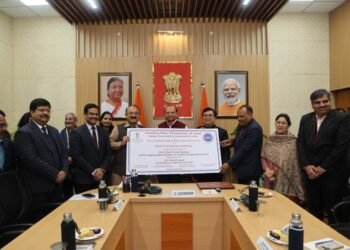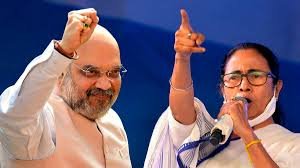Trump hails Modi’s alleged pledge to halt Russian oil imports, aiming to weaken Russia’s war efforts while keeping India in check. Congress calls for a reset to protect national sovereignty.
BY PC Bureau
In a blistering critique that has set Indian social media ablaze, Leader of the Opposition Rahul Gandhi accused Prime Minister Narendra Modi of being “frightened” of U.S. President Donald Trump—hours after Trump claimed Modi had privately promised to halt India’s purchases of discounted Russian oil.
Gandhi’s early Thursday tweet listed five alleged instances of Modi’s capitulation, framing it as a blow to India’s sovereignty and foreign policy independence. The post comes amid escalating tensions in India-U.S. relations, strained by Trump’s aggressive trade tariffs targeting New Delhi for continuing to buy Russian crude—a lifeline for India’s energy needs amid global price volatility.
Trump’s revelation on Wednesday, delivered casually during a White House press interaction, caught Indian officials off guard, with no immediate confirmation from the government. Critics like Gandhi see it as evidence of Modi’s personal rapport with Trump trumping national interests, while supporters hail it as pragmatic diplomacy to ease economic pressures.
READ: Trump Says PM Modi Assured India Will Halt Russian Oil Imports
Trump’s Oval Office Bombshell
Speaking to reporters in the Oval Office on October 15, President Trump—fresh off a meeting with his nominee for U.S. Ambassador to India, Sergio Gor—expressed his long-standing frustration with India’s Russian oil imports. Russia has been India’s largest oil supplier since the Ukraine war began in 2022, exporting around 1.62 million barrels per day in September alone, nearly a third of New Delhi’s total imports.
“These purchases, often at steep discounts due to Western sanctions on Moscow, have helped shield Indian refiners from soaring global prices and domestic inflation,” Trump said. “I was not happy that India was buying oil. And [Modi] assured me today that they will not be buying oil from Russia. That’s a big step.”
Trump added that the transition would take time—“It’s a little bit of a process, but the process will be over with soon”—while praising Modi as “a great man” who “loves Trump.” He framed the alleged pledge as a geopolitical win aimed at starving Russia’s war chest in Ukraine, adding, “Now we’re going to get China to do the same thing,” signaling his broader campaign to isolate President Vladimir Putin economically.
The comments cap months of U.S. pressure, including a controversial 50% tariff hike on Indian goods announced in August, explicitly tied to India’s continued Russian dealings. The combined 25% baseline and 25% additional levy has hit Indian exporters hard, fueling domestic outrage.
The Indian Embassy in Washington has remained tight-lipped, neither confirming nor denying Modi’s purported assurance. Sources close to the Prime Minister’s Office suggested the discussions were part of ongoing bilateral talks on energy security and trade, but declined further comment. Analysts speculate the timing—days after Gor’s meeting with Modi in New Delhi—could pave the way for tariff relief and a potential Trump-Modi summit at the ASEAN gathering in Malaysia later this month.
Gandhi’s Five-Point Indictment
PM Modi is frightened of Trump.
1. Allows Trump to decide and announce that India will not buy Russian oil.
2. Keeps sending congratulatory messages despite repeated snubs.
3. Canceled the Finance Minister’s visit to America.
4. Skipped Sharm el-Sheikh.
5. Doesn’t contradict him…— Rahul Gandhi (@RahulGandhi) October 16, 2025
Rahul Gandhi, a scion of India’s Nehru-Gandhi political dynasty and a vocal Modi critic, quickly seized on Trump’s statement. In a tweet at 3:47 AM GMT on October 16—hours after Trump’s remarks—he unleashed a numbered takedown portraying Modi as buckling under personal pressure.
READ: Delhi Special Courts to Now Hear Cases Against Ex-Lawmakers
“PM Modi is frightened of Trump,” Gandhi wrote, kicking off a thread that garnered thousands of likes and reposts within hours.
His five-point list included:
-
Allowing Trump to announce India will not buy Russian oil, implying Modi outsourced a key energy decision to the U.S. without public consultation.
-
Sending congratulatory messages despite repeated snubs, referencing Modi’s praise for Trump’s 2024 election victory.
-
Canceling Finance Minister Nirmala Sitharaman’s visit to the U.S., allegedly due to stalled trade talks and tariff threats.
-
Skipping the UN Climate Summit in Sharm el-Sheikh, seen as avoiding arenas where U.S. influence loomed large.
-
Not contradicting Operation Sindoor, referencing murky intelligence or counter-terrorism operations possibly involving U.S. oversight.
This is not Gandhi’s first salvo on the issue. In August, as tariffs first hit, he accused Modi of being constrained by a U.S. probe into the Adani Group’s Russian-linked dealings. “Trump’s 50% tariff is economic blackmail,” he tweeted, urging Modi to defend India’s interests.
Broader Fallout
The controversy underscores India’s challenge in balancing historic ties with Russia—vital for defense and energy—with deepening U.S. strategic partnerships under the Quad alliance against China. Russian oil has saved India an estimated $10-15 billion annually in import costs, but U.S. sanctions view it as funding Russia’s war in Ukraine.
If Modi’s pledge holds, India may pivot to pricier Middle Eastern or American oil, potentially inflating domestic fuel prices ahead of state elections. Congress allies, including Jairam Ramesh, have called for a “comprehensive reset” of foreign policy inspired by Indira Gandhi’s defiance of U.S. pressure in the 1970s.
International observers are watching closely. Bloomberg noted the development could “signal a resolution to an issue at the center of the diplomatic and trade rift,” potentially unlocking stalled free-trade talks. Al Jazeera highlighted India’s energy vulnerability, warning abrupt cuts could worsen inflation in the world’s third-largest oil consumer.
Gandhi’s tweet has undoubtedly reignited debates over Modi’s “strongman” image versus perceived concessions abroad. With Parliament’s winter session looming, this issue is expected to dominate Question Hour. One thing is clear: in the high-stakes game of global oil and alliances, personal relationships—and pointed tweets—are proving as potent as any tariff.













